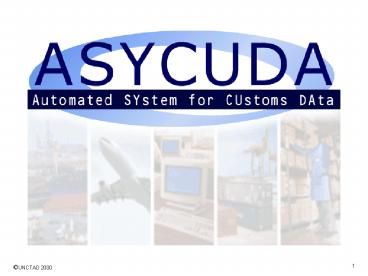ASYCUDA Overview Pt. 2 - PowerPoint PPT Presentation
1 / 23
Title:
ASYCUDA Overview Pt. 2
Description:
Concessions, exemptions. Customs procedures and controls ... Record full details of duties forgone through concessions and relief schemes ... – PowerPoint PPT presentation
Number of Views:360
Avg rating:3.0/5.0
Title: ASYCUDA Overview Pt. 2
1
(No Transcript)
2
- a summary of the objectives of ASYCUDA
implementation projects and features of the
software for the Customs computer system.
3
ASYCUDA
- ASYCUDA is a computer program developed by
UNCTAD as a Customs automatic data processing
system. - ASYCUDA was developed in the interests of
facilitating international trade and so assist
economic development. - The reliance of national revenue on the
collection of duties and taxes, and accurate
trade statistics, is a strong incentive for the
introduction of computers to Customs.
4
ASYCUDA
- . however, technology is only a part solution to
trade facilitation issues. - Many problems experienced by countries are
partly the result of inefficient or complex
Customs procedures and documentary requirements.
In implementing ASYCUDA UNCTAD encourages the
adoptionof new procedures and concepts.
5
ASYCUDA
- UNCTADs objective is simply that the
- country obtains the maximum possible
- benefit from the implementation of
- ASYCUDA by -
- Meeting the countrys own national objectives
and - Achieving trade facilitation through
standardisation and simplification.
6
ASYCUDA
In implementing a major project such as ASYCUDA,
there are many factors critical to success.
Effective computer software is an essential
component, but other contributing factors are of
equal importance
7
ASYCUDA
Government Management Support
Project Management And Technical Skills
Facilities and Equipment
ASYCUDA Software
8
All components are essential for the complete
success of an ASYCUDA Implementation Project.
ASYCUDA
- Visible support by all levels of the National
Administration. - Skills in Project Management, Information
Technology and modern Customs control methods. - Suitable infrastructure, including office
facilities and equipment. - Effective and flexible Customs software, such as
ASYCUDA.
9
ASYCUDA
- Management support means that a high level
commitment is needed to see that - - Adequate human and material resources are
allocated to support both implementation and long
term operations under new procedures. - Any necessary legislative changes are supported
and promptly introduced, to allow for new
procedures.
10
ASYCUDA
- Changing to new processing methods often means
that fundamental changes to organisational
structures are needed. - Changes mean that new skills are required and
staff will need training for new levels of
responsibility.
11
ASYCUDA
- The task of the Project Management Team is to
ensure effective implementation by linking the
Project Objectives to the Government and Customs
strategies.
- Skills transfer is an important part of any
Project - - Technical expertise in Information Technology
- Modern Customs management techniques and
- Project management skills
12
ASYCUDA
- The final design and set up of the system to meet
national requirements is done by the national
team, who are usually regular Customs staff. - The team is also responsible for the procedural
changes, local training and implementation. - This is done following training and with the
advice and guidance of the Project Experts.
13
ASYCUDA
Project managementmethodology, quality
controls and documentationstandards are the
responsibility ofProject Management.
Through training and skills transfer the
national team will learn and do much of the work
in the implementation.
System Sustainability is the key objective!
14
ASYCUDA
- The introduction of computers means more than
just hardware purchase and installation. - Major works are frequently needed at office
installation sites. - The provision of communications facilities and
changes to office layouts (to accommodate new
processes) are often the cause of project delays
if not allowed for in the planning process.
15
ASYCUDA
- An incidental but very significant benefit of
process change and the adoption of automatic data
processing is the improvement in facilities and
the working environment of the staff.
16
ASYCUDA
- A computer system for
- Customs Control
- Duty and tax collection
- Accurate trade statistics
- - by using and producing information and data
17
ASYCUDA
- ASYCUDA information or data sources include -
- Laws, regulations and policies, of Customs and
other agencies - Commercial sources - industry and trade
- Customs records and intelligence gathering
operations
18
Information or Data
- The system uses or provides information on -
- Restrictions, prohibitions
- National tax regimes
- Concessions, exemptions
- Customs procedures and controls
- Advisory information is made easily accessible
to staff and traders
19
Information or Data
- Commercial data or information is received from
- - Traders (importers and exporters)
- Customs brokers/agents
- Carriers, transport companies
- Port and airport authorities
20
Information or Data
- ASYCUDA assists Customs Administrations in
collecting, analysing and using information from
- - External intelligence sources, such as industry
information and from the public - Inspection reporting risk measurement procedures
and selective examinations - Database analysis
- Management information systems audit activities
21
- ASYCUDA provides data validation and security
- Consistency checking of Customs declarations
- International standard data codes
- Checks using acceptable unit value range
comparisons - Full selectivity and profiling options
- Integrity of data storage and transaction details
22
- Flexible and reliable tax calculation
mechanisms - Easy to set up for any tax situation
- Record full details of duties forgone through
concessions and relief schemes - Simple updates and maintenance
- Fully integrated with cashier and accounting
23
- ASYCUDA collects and stores complete data for
national statistics - - Standard report formats for quick response to
data extraction requests - Flexible data downloadable to PC databases for
sorting and reporting - SQL query for routine reporting
- Data security
24
See also the presentations on -































